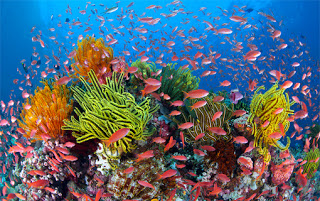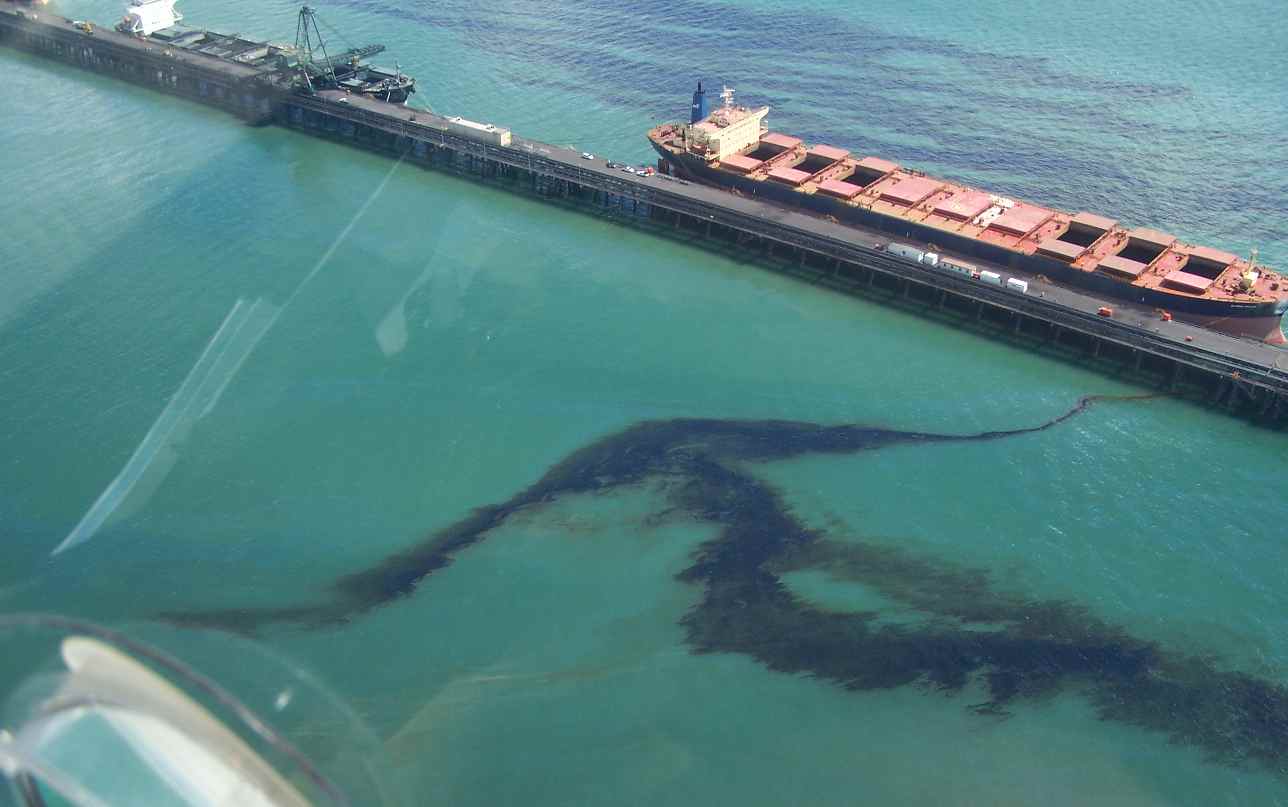Final Project and Presentation for Geography 5 with Dr. Gillespie
by Grace Aleman and Stephanie Orpilla
UCLA Fall 2013

by Grace Aleman and Stephanie Orpilla
UCLA Fall 2013
¡Los arrecifes de coral de Australia son magníficos! Los arrecifes de coral son casas de muchas especies de pescados. Además muchas personas les gusta nadar en el mar con los arrecifes de coral. La ecosistema de los arrecifes de coral es muy frágil. Es importante que los personas conservar los arrecifes de coral porque la ecosistema es sensible al cambio de la atmósfera.
Die Korallenriffe in Australien sind sehr schön. Sie haben viele seltene Fische und Koralle. Leute reisen hier zu schwimmen und schnorcheln. Aber die Korallenriffe sind zerbrechlich und empfindlich mit Änderung. Wir müssen die Korallenriffe gegen Verschmutzung schützen.
Map of Australia's Great Barrier Reef
The Great Barrier Reef is made up of many smaller reefs; this compilation of all the reefs is why it is considered a barrier reef. The Great Barrier Reef is located off the northeastern coast of Australia in the Coral Sea of the Pacific Ocean. One function of a barrier reef is protection. The Great Barrier Reef protects the coast of Australia and acts as a buffer against storms.
History of The Great Barrier Reef
The Great Barrier Reef started to form about 50 million years ago with the formation of the Coral Sea Basin. Movement of Australia in pangea caused sea levels and the water climate to fluctuate, affecting coral growth and ultimately resulting in the reef dying. Our present day Great Barrier Reef started to grow over the dead reef about 20 thousand years ago. The Earth’s most recent glaciation ended around this time and caused rising sea levels that flooded the coast of Australia. The sunlight and shallow water here created the perfect environment for new coral reefs to grow. In June of 1768, the French were the first to document the Great Barrier Reef as they sailed past Australia.
Historical State of the Great Barrier Reef
A 2012 study by the Australian Institute of Marine Science suggests that the Great Barrier Reef’s coral cover is only half of what it was just 27 years ago. This depletion of the coral cover is problematic for diversity of life in the Great Barrier Reef. With less coral cover, the Australian coast also has less protection from storms.
Human Impacts on the Great Barrier Reef
The coral and algae that make up reefs have a symbiotic relationship with one another. The corals get oxygen and nutrients from the algae and the algae gets carbon dioxide and ammonia from the coral. When humans damage one, they damage the other. Damaging the coral reefs hurts the other species that live there. 65% of fish in the reefs need to live near or in coral. There is a species area relationship: as the area of coral disappears, the diversity of species living there also decreases.
Human-caused global warming impacts the Great Barrier Reef. Our increased methane and carbon dioxide emissions, especially from our coal, petroleum, and natural gas usage and deforestation, cause increased greenhouse gases in the atmosphere. These gases trap more heat from the sun on earth and the average temperatures of the earth and the ocean go up. This causes thermal expansion and rise in sea level. Algae, a major part of reefs need shallow water so they can photosynthesize. Sunlight cannot pass through deep water to algae and this kills them. Algae also need cold water to live, but global warming increases water temperatures. When the water gets warm, algae detach from the coral. This coral bleaching causes the coral to become pale and die.
Another human impact on the Great Barrier Reef is pollution. Sediments from deforestation get into the ocean water and sink to the bottom over the coral. Fertilizers in the water can cause the algae to grow and overpower the coral and other organisms in the water. Pesticides that get in the water can kill the flora and fauna of the Great Barrier Reef. Human waste and oil spills also make the water dirty and can kill the animals and plants.
2010 Oil Spill near the Great Barrier Reef
Future prospects for coral reefs
If things continued to progress without change, it is likely that the Great Barrier Reef of Australia would become significantly diminished. Australia’s push towards development of new ports will have profound impacts on coral reefs. To build or expand ports dredging is done, this process removes sediment from the ocean floor in order to make room for the port. This can create very murky water which decreases the amount of sunlight that coral reefs receive. Less sunlight means that it is harder for the algae to photosynthesize and feed itself and the coral. Additionally, as the effects of global warming become more and more apparent, coral reefs will also suffer. Even a slight change in ocean temperature, increase or decrease, can cause coral reefs to feel stressed and expel the algae living on them. The expulsion of the algae from the coral is known as coral bleaching. Loss of coral reef is not only affects the actual coral, but also the other fish that use the coral as both food and habitats. Any amount of coral loss can significantly affect the ecosystem and create a huge loss of biodiversity.
Improving and maintaining coral reefs
In order to help preserve the Great Barrier Reef, and other coral reefs around the world, it is necessary to educate the public on these ecosystems and the threats they face. In particular, if Australians were informed about the consequences of building new ports, or expanding current ports, then they would be more likely to take a stand against these ports. They also might try to enforce stricter regulations on building or expanding ports. On a more global scale, knowledge about climate change can influence people’s actions. The more people know, the more willing they will be to change their actions to help slow the effects of global warming. One way to spread knowledge to people about coral reefs is through ecotourism. Scuba diving is huge industry in Australia. By promoting scuba diving around the Great Barrier Reef, it is more likely that the reef will be conserved. Scuba diving is a great way of exposing people to the beauty of coral reefs. The more people who scuba dive, the more people will understand why coral reefs should be preserved and the more people that will take a stand to protect coral reefs.
Fun with Coral and GIS
For a more interactive look at coral reefs around the world, check out this website. It's super cool!
Works Cited
"Biodiscovery and the Great Barrier Reef." Pollution and Other Factors. Queensland Museum, n.d. Web. 26 Nov. 2013. <http://www.qm.qld.gov.au/microsites/biodiscovery/05human-impact/pollution-and-other-factors.html.
"Conserving the Great Barrier Reef." Australian Conservation Foundation. Australian Conservation Foundation, n.d. Web. 26 Nov. 2013. <http://www.acfonline.org.au/about-us/our-success-stories/conserving-great-barrier>.
"Great Barrier Reef." - UNESCO World Heritage Centre. United Nations Educational, Scientific, and Cultural Organization, n.d. Web. 26 Nov. 2013. <http://whc.unesco.org/en/list/154>.
"The Great Barrier Reef." About.com Geography. About.com, n.d. Web. 26 Nov. 2013. <http://geography.about.com/od/australiamaps/a/great-barrier-reef.htm>.
"Great Barrier Reef." WWF. WWF, n.d. Web. 25 Nov. 2013. <http://www.wwf.org.au/our_work/saving_the_natural_world/oceans_and_marine/priority_ocean_places/great_barrier_reef/>.
"History of the Great Barrier Reef." History and Evolution. N.p., n.d. Web. 25 Nov. 2013. <http://www.greatbarrierreef.org/history.php>.
"Human Impact on the Great Barrier Reef: Introduction." Human Impact on the Great Barrier Reef: Introduction. University of Michigan, n.d. Web. 26 Nov. 2013. <http://sitemaker.umich.edu/gc2sec7labgroup3/introduction>.
"Human Impact on the Great Barrier Reef: Pollution." Human Impact on the Great Barrier Reef: Pollution. University of Michigan, n.d. Web. 24 Nov. 2013. <http://sitemaker.umich.edu/gc2sec7labgroup3/pollution>.
"The Nature Conservancy. Protecting Nature. Preserving Life.™." The Nature Conservancy. The Nature Conservancy, n.d. Web. 24 Nov. 2013. <http://www.nature.org/ourinitiatives/urgentissues/coralreefs/coral-reefs-coral-bleaching-what-you-need-to-know.xml>.
Safina, Carl, and Elizabeth Brown. "Australia Authorizing Destruction of Great Barrier Reef."News Watch. National Geographic, 18 Nov. 2013. Web. 26 Nov. 2013. <http://newswatch.nationalgeographic.com/2013/11/18/australia-authorizing-destruction-of-great-barrier-reef/>.
No comments:
Post a Comment